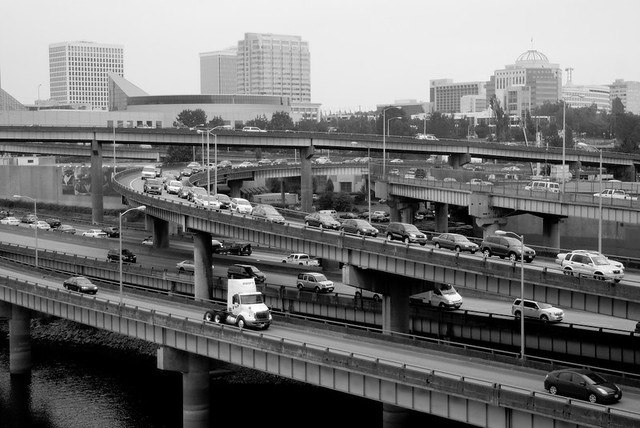
(Photo: J. Maus/BikePortland)
We are living in a time of extremes: climate, politics and public opinion have all ceded the moderate middle in favor of the faraway edges. When it comes to policy debates, ideas that once seemed too extreme to be taken seriously have managed to crawl their way back into the mainstream.
This is the context for a troubling turn in our regional transportation conversation. Where we once prided ourselves on tearing out and opposing mega-highway projects that encouraged single-occupancy driving, we are now drafting plans and crafting laws to make them easier to build. Even organizations and leaders who should know better are supporting this extreme idea.
Back in February, TriMet General Manager Neil McFarlane advocated for three freeway expansion projects in the Portland region during a speech in Washington County. After transportation activists turned up at a TriMet board meeting to express their disappointment in his stance, McFarlane accused the media who accurately covered his speech as being nothing more than “fake news” outlets.
Also last month, Oregon State Representative Rich Vial went public with his plans for a massive new highway on the west side he’s dubbed the “Northwest Passage”. Rep. Vial isn’t just sharing a pet project, he’s pushing House Bill 3231, which would give broad powers to local governments to build highways without the state’s support. That bill is being taken seriously enough to have earned a public hearing scheduled for this Wednesday (4/5).
At a panel last month Leah Treat, director of the Portland Bureau of Transportation said she supports the widening of I-5 through the Rose Quarter, as long as the project also builds new bikeways and other upgrades on adjacent surface streets. “There’s a need to address through-put,” she said, acknowledging that adding freeway capacity is the only way to get the “yes” votes needed for a transportation funding package.
On the heels of all this surprising support for freeway expansions, John Charles from the Cascade Policy Institute (a conservative/libertarian think tank) felt the time was right to publish a blog post titled, “Let’s build some highways.” Charles said the “philosophy” of transit investments instead of new highways and progressive land-use policies that discourage sprawl have “failed”. He wants to use HB 3231 to “jump-start the highway-building process”.
“Motorists deserve all the highways they are willing to pay for,” Charles wrote (as if cost — not death, destruction, pollution, social isolation, or negative public health outcomes — is the only consideration).
Advertisement
Fortunately this sudden normalization of highway building has not gone unnoticed.
Two weeks ago a new coalition came together to demand that any freeway expansions come with equal funding for active transportation.
And on Thursday, 1000 Friends of Oregon encouraged their supporters to show up and testify against HB 3231. Deputy Director Mary Kyle McCurdy sent out an email with this message:
“… Although no route is described in the bill, HB 3231’s chief sponsor described a tollway extending from Woodland, WA, crossing to Highway 30 in Oregon at either Columbia City or Portland just west of the I-5 bridge (so on a new bridge) and then through Forest Park, both intersecting with Highway 26 at Cornelius Pass, then paving a swath across the Tualatin Valley west of the current UGB, Yamhill County, and French Prairie, and joining I-5 somewhere south of Donald in Marion County.
This proposal is a dinosaur road project – it would not have been a solution in the last century, much less in this century. It would be a colossal waste of taxpayer money, sucking every dollar of Oregon’s already shrinking transportation funding capacity and leaving the rest of the state’s roads even more underfunded for repairs and maintenance. It is time to stop dredging up these dinosaurs, and start talking about a transportation system that meets the needs of all Oregonians for the next century – and that mean serious investment in transit, walking, and bicycling.”
While McCurdy admits HB 3231 isn’t like to pass, she doesn’t want to take any chances. “A large turnout is important to ensure that this bill goes no further than a ‘courtesy” hearing,” she wrote.
Oregon’s environment and transportation advocacy groups seem to have learned a major lesson: Four years ago they sat on the sidelines as the Columbia River Crossing freeway expansion project nearly became a reality.
Highway expansion is an extreme idea that leads to incalculable negative externalities. If we are silent as it creeps back into the mainstream, it will become normalized. That’s a risk none of us should be willing to take.
Public Hearing for HB 3231
House Committee on Transportation Policy (link)
Wednesday, April 5th at 8:00 am
You can email testimony to htp.exhibits@oregonlegislature.gov and cc your local representative (find them here)
— Jonathan Maus: (503) 706-8804, @jonathan_maus on Twitter and jonathan@bikeportland.org
BikePortland is supported by the community (that means you!). Please become a subscriber or make a donation today.


